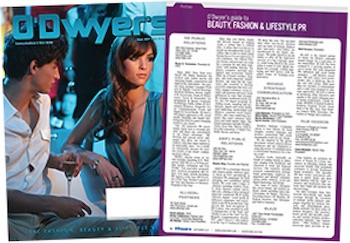|
|
For years, companies scouted out the world’s most recognizable stars to take part in their marketing campaigns, with many forking over millions to use their name and likeness for endorsements and brand growth. Within the past decade, however, the rise of social media has had an immense impact on the current marketing landscape.
In 2015, Bloomberg announced that Americans now spend more time on social media apps than TV. Social media channels and video platforms have grown in popularity with substantially large user and fan bases, bringing to light a whole new vertical of marketing possibilities. With some channels and profiles raking in millions of views and followers — more than most brand pages — companies are eager for a way to tap into this market. Companies are taking notice and are now turning to influencers, or social media stars, to produce exceptional levels of engagement for online marketing campaigns.
|
|
The fashion and beauty industry are leading the charge with influencers, and most have a keen understanding of how this strategy works for product marketing campaigns. This year, Fashion and Beauty Monitor stated that 57 percent of companies in these sectors use influencers as part of their marketing mix. An additional 21 percent are also planning to add this strategy to their campaigns in the next year, and it looks like the use of influencer marketing for companies will only grow from here.
Let’s take a closer look at why companies are making a conscious shift to include influencers in their marketing plans, and how it’s not only beneficial to the brand but also more cost effective than traditional celebrity endorsements.
People trust real people
Before influencers, celebrities were key to brand exposure and reaching the consumer in a more personal way. However, as the marketing landscape changed so did consumer interest.
According to a 2015 Nielsen’s Global Trust in Advertising Report, more than eight-in-10 global respondents (83 percent) say they completely or somewhat trust the recommendations of friends and family. The fact that most of our favorite celebrities have on-call hair dressers, makeup artists, nannies, chefs, trainers and the like makes them less relatable than an influencer living a life like ours. When it comes to trustworthiness and being relatable, influencers take the cake over traditional celebrity endorsements.
A great example is L’Oreal Paris UK, an internationally well-known beauty brand, which in late 2016, announced it was signing on five beauty influencers to create its own “beauty squad.” According to an interview the brand’s UK general manager Adrien Koskas states she hopes to “shift the industry towards something that is more genuine.” When asked what the strategic thinking was behind this move, Koskas said, “It was quite natural for us to move in this direction as consumers are really changing the way they interact with brands and are very engaged on social media.”
One of the leading industries utilizing influencers as celebrities is beauty. In 2015, BECCA Cosmetics, a full range make-up, cosmetic and beauty product line, partnered with makeup artist turned social media influencer Jaclyn Hill to launch a limited-edition highlighter called “Champagne Pop.”
Jaclyn Hill’s professional makeup artist background — with more than three million YouTube subscribers and a loyal fan base — made her an ideal influencer for BECCA’s campaign and proved how successful it can be to work with influencers. So successful, in fact, that it broke Sephora’s record to become the store’s most-purchased product on its first day of release alone.
Digital content is king
Influencers provide items that most celebrities cannot, digital content. Ever since YouTube, Instagram and blogging came to prominence, online content has been a large part of the web-surfing experience for many people. Social media is now more important than ever when it comes to marketing a brand’s products and services. YouTubers, for example, are leading the way to create digital content that is both easily digestible and fun to watch — unlike many traditional brand advertisements.
Digital content produced by influencers is not only beneficial for the brand’s product development but also provides and supports their online presence and can be repurposed for future marketing and advertisement campaigns.
When it comes to the beauty industry, nothing attracts consumers more than a review video, or how-to tutorial from their favorite beauty guru or influencer and major brands are taking notice. As Koskas of L’Oreal Paris states, “First, we’ll make sure all five girls are as involved as possible. Obviously, we want to create a lot of content for our consumers, to help consumers find what they’re looking for online in terms of beauty advice. Our event strategy is also becoming critical to us. They will attend big events such as Paris Fashion Week, so they can share their experience with the rest of the world and give their followers and our fans a behind-the-scenes or front-row view.”
A win-win situation
An influencer’s popularity is based on how well they connect with their audience and fan base. Although most celebrities carry an impressive amount of social media followers, the core of them may not be your target audience. Additionally, when taking a deeper dive into their analytics, most celebrity profiles are lacking in engagement and conversation, making them less ideal for a social media campaign.
Most influencers have a specific niche they attract to their platforms, which may align perfectly with a brand’s demographic. These influencers also have a loyal fan base across multiple channels that they engage with regularly and who look to them for truthful, unfiltered advice and reviews. At times, these influencers may even have a larger, more engaged social media following than the companies themselves.
When it comes to working with an influencer, the benefit of collaborating goes both ways. Companies can work with influencers to tap into an audience they otherwise do not have access to or lack brand loyalty and product knowledge with. However, on the contrary, it also helps build the credibility of the influencer to have a household brand name using their expertise and social platform to share their product message. Working off each other’s following and national credibility makes it a more beneficial and successful relationship overall.
***
Nadia Duwaik leads Marketing Maven’s influencer marketing practice out of its LA headquarters. She can be reached at [email protected].

 Nadia Duwaik
Nadia Duwaik

 Kim Kardashian West is using Full Picture PR for a $200M alliance with COTY Inc. to expand her KKW Beauty's product line and open new market categories.
Kim Kardashian West is using Full Picture PR for a $200M alliance with COTY Inc. to expand her KKW Beauty's product line and open new market categories. Fashion PR pro Kelly Cutrone has charged hip-hop mogul Russell Simmons with a rape attempt in 1991.
Fashion PR pro Kelly Cutrone has charged hip-hop mogul Russell Simmons with a rape attempt in 1991. Fashionable travel luggage and accessories are focusing on becoming more tech-centered to meet traveling and space-saving demands.
Fashionable travel luggage and accessories are focusing on becoming more tech-centered to meet traveling and space-saving demands. For lifestyle PR to be effective today, practitioners must lead with audience-centric strategies that meet consumers on the platforms they use, when they use them, with strong storytelling at its core.
For lifestyle PR to be effective today, practitioners must lead with audience-centric strategies that meet consumers on the platforms they use, when they use them, with strong storytelling at its core. It used to be standard for PR professionals to operate firmly behind the scenes. However, this invisibility can come at a cost to opportunities for thought leadership, discovery and an enhanced online presence that are metrics of success in our digital world.
It used to be standard for PR professionals to operate firmly behind the scenes. However, this invisibility can come at a cost to opportunities for thought leadership, discovery and an enhanced online presence that are metrics of success in our digital world.


 Have a comment? Send it to
Have a comment? Send it to 
No comments have been submitted for this story yet.